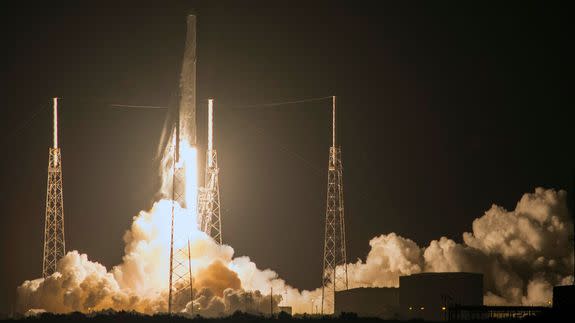SpaceX's Falcon 9 rocket to fly again for first time since explosion

Almost immediately after SpaceX's catastrophic Falcon 9 rocket explosion in September, people started wondering when Elon Musk's private spaceflight company would fly again.
Now, we finally have an answer.
According to an update released Wednesday, SpaceX is planning to launch its first mission since the mishap in January, after completing its investigation into the accident.
SEE ALSO: SpaceX's bold plan to deliver worldwide internet with 4,425 satellites
"We are finalizing the investigation into our Sept. 1 anomaly and are working to complete the final steps necessary to safely and reliably return to flight, now in early January with the launch of Iridium-1," SpaceX said in the statement.
"This allows for additional time to close-out vehicle preparations and complete extended testing to help ensure the highest possible level of mission assurance prior to launch."
The January mission should deliver 10 communications satellites to orbit.
The September accident at the company's launch site in Florida destroyed the Israeli-made Amos-6 satellite when the Falcon 9 rocket it was housed within blew up on the pad just before a test.
Experts working with the company, NASA, the Air Force and the Federal Aviation Administration have traced the explosion to a fuel tank in the second stage of the rocket, though the specific root cause of the accident hasn't been released.
"I still haven't heard anything official from the FAA regarding whether they approved the return to flight or not," industry analyst Bill Ostrove told Mashable via email.
"Assuming they do approve SpaceX's plan, the investigation has been positive for the company," he said. "They will have returned to flight faster than the last time. That is important for SpaceX, which has had issues with launch tempo in the past."
Originally, Iridium said the launch was expected to occur in December.
Musk has said that this was the most difficult accident investigation in the 14-year history of the company.
Still working on the Falcon fireball investigation. Turning out to be the most difficult and complex failure we have ever had in 14 years.
— Elon Musk (@elonmusk) September 9, 2016
The September accident was the second SpaceX failure in the span of about 15 months.
Another Falcon 9 rocket exploded just after liftoff in June 2015, forcing the company to stand-down for months as the incident was investigated. That failure was traced to a different problem than the most recent mishap.
"Four months is on the fast side for a return to flight, but not abnormally so. It's only a little shorter than the six months it took SpaceX the last time," Ostrove said.
"One of the longest return-to-flights in recent memory is Orbital ATK's Antares, which did not launch between October 2014 and October 2016," he added, noting that the company upgraded the rocket's engines during that time.
All in all, SpaceX has about a 93 percent success rate, which is about two points below average for the industry at large. The accident did cause some experts to question whether the company has taken on too much, too quickly.
At the moment, the company launches missions for private companies and government entities. SpaceX is also in the process of developing a spacecraft designed to take astronauts to the International Space Station for NASA, and it ultimately has ambitions to take humans to Mars.
SpaceX is also performing reusable rocket tests by bringing the first stages of its launchers back down to Earth after launching payloads to space. It's thought that eventually this will greatly reduce the cost of spaceflight.
However, it's unlikely that SpaceX will cut back on its ambitions anytime soon.
"I suspect that SpaceX is unlikely to dial back its various efforts, as Elon Musk is calling the shots and words such as 'caution' and 'moderation' do not appear to be part of his vocabulary," industry analyst Chris Quilty said in September.
